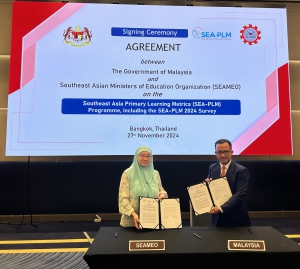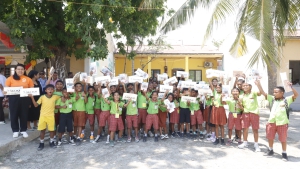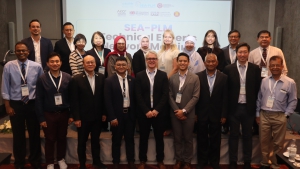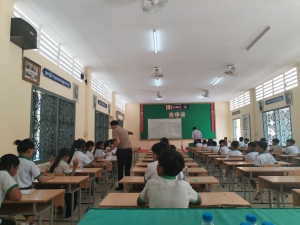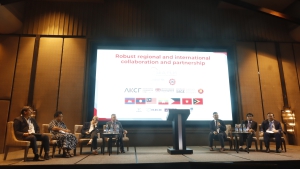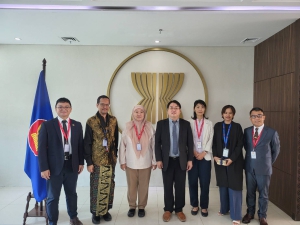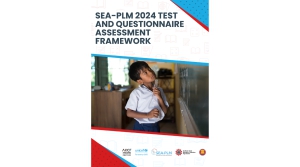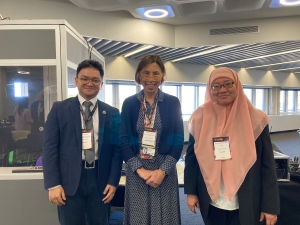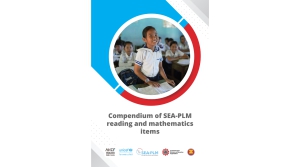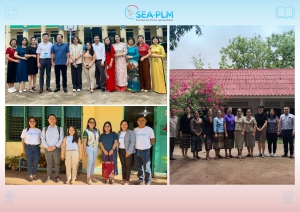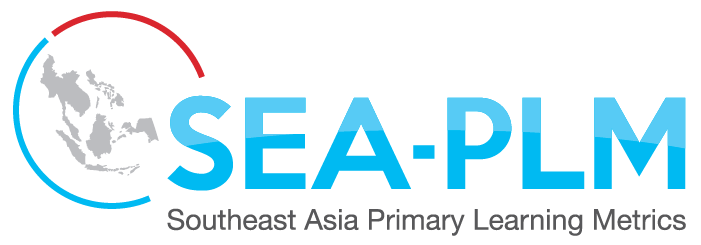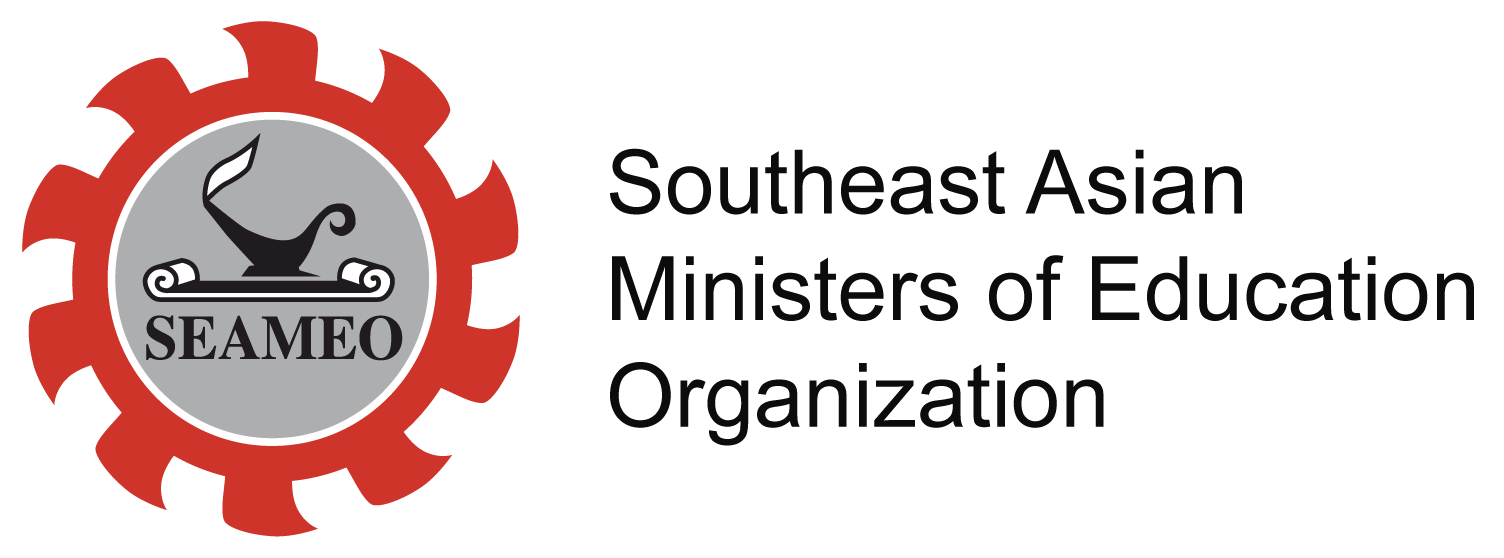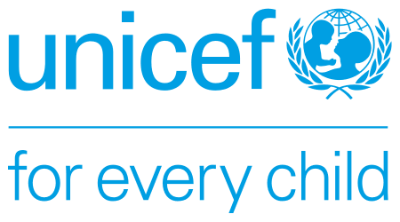Strengthening collaboration through SEA-PLM: Ceremonial Signing of the Agreement between the SEAMEO Secretariat and the Ministry of Education Malaysia
Datuk Dr. Habibah, representing SEAMEO Secretariat, and Datuk Haji Ruji bin Haji Ubi from the Ministry of Education Malaysia officially signed the Memorandum of Understanding to solidify collaboration on the SEA-PLM programme.
On November 27, 2024, a significant milestone was achieved with the ceremonial signing of an agreement between the SEAMEO Secretariat and the Ministry of Education, Malaysia, reaffirming their collaboration on the Southeast Asia Primary Learning Metrics (SEA-PLM) programme, particularly on the conduct of SEA-PLM 2024. Representing the SEAMEO Secretariat during the ceremonial signing, Datuk Dr. Habibah forged this commitment alongside the Ministry of Education, Malaysia, solidifying a shared vision of improving foundational learning and advancing basic education in the region. This symbolic event was hosted by the SEAMEO Secretariat during the 47th SEAMEO High Officials Meeting, held from November 26 to 27. The 47th SEAMEO High Officials Meeting brought together high-ranking delegates from Ministries of Education and partner organizations across Southeast Asia. This gathering provided an opportunity to reflect on the progress made in addressing SEAMEO’s priority areas over the past year and to chart the path forward for strengthened collaboration in education, science, and culture.
Delegates gather during the 47th SEAMEO High Officials Meeting to discuss progress and strategies in advancing education, science, and culture across the region
Malaysia, as one of the six countries that participated in the inaugural SEA-PLM survey in 2019 reaffirmed its dedication to advancing evidence-based educational policies through sustained monitoring of student learning outcomes. The collaboration between SEA-PLM and Malaysia demonstrates a commitment to leveraging large-scale assessments as a cornerstone of effective policymaking. SEA-PLM surveys aim to provide robust data that support the government in formulating evidence-driven strategies to improve learning outcomes and bridge educational gaps. This ongoing partnership reflects a shared determination to tackle the challenges in the education sector and ensure that every child in Southeast Asia receives a quality and equitable primary education.
As Malaysia and SEAMEO embark on this renewed journey, the agreement signifies a deepened collaboration to harness data, insights, and regional cooperation to achieve transformative educational improvements. The outcomes of SEA-PLM 2024 are anticipated to provide invaluable insights that will guide national and regional education strategies, further solidifying the program’s role in shaping the future of learning in Southeast Asia.
|
|
|
|
|
https://x.com/SEAPLM_S |
|
|
SEA-PLM 2024 Main Survey advances in Timor-Leste along with the National Launch of the 2023 GEM Report on Technology in Education
From October 28 to 29, 2024, representatives from the SEAMEO Secretariat, SEA-PLM Regional Secretariat, and UNICEF East Asia and Pacific Regional Office embarked on a fruitful mission to Timor-Leste, supporting the 2024 Main Survey implementation and launching of the 2023 Global Education Monitoring (GEM) report on Technology in Education in Southeast Asia.
Datuk Dr Habibah Abdul Rahim, Director, SEAMEO Secretariat and Her Excellency Ms. Dulce de Jesus Soares, Minister of Education of Timor-Leste during courtesy meeting.
The mission began with a courtesy visit to Her Excellency Ms. Dulce de Jesus Soares, Minister of Education in Timor-Leste. This meeting has strengthened the partnership between Timor-Leste’s Ministry of Education and the SEA-PLM programme as the country embarks on its first participation in an international large-scale assessment. The meeting also reaffirmed the shared commitment to enhancing education for all Timorese children and across the region
Students of EBC 1.2.3 Farol taking the SEA-PLM 2024 assessments
Supporting the 2024 Main survey test administration, the SEAMEO Secretariat served as International Quality Monitors (IQM) to observe the 2024 main survey processes and procedures in alignment with the SEA-PLM regional technical standards. The monitoring process also includes recording best practices and national processes that capture the unique context of Timor-Leste. Schools visited included in Timor-Leste include the EB Catolica 1.2.3 Santa Maria Auxiladora and EBC 1.2.3 Farol
Group photo of SEA-PLM Regional Secretariat with the representative of Ministry of Education and (From left to right, Mr Abraão Mendonça, Mr Alejandro ibanez, Mr. Apolinario Serpa Rossa, Mr. Paulino Gomes)
Following the survey observation, the SEA-PLM team held discussion to evaluate survey implementation progress and exchanged feedback to further strengthen quality and ensure effective administration.
Datuk Dr Habibah Abdul Rahim, Director, SEAMEO Secretariat and Her Excellency Ms. Dulce de Jesus Soares, Minister of Education of Timor-Leste
The mission concluded with the SEA-PLM Regional Secretariat’s participation in the launch of the 2023 Global Education Monitoring (GEM) Report on Technology in Education in Timor-Leste. Co-Developed by UNESCO and SEAMEO Secretariat, this report emphasizes technology’s transformative role in the region’s education sector, particularly through investments in digital skills and improved connectivity. With its findings tailored to the Southeast Asian context, the GEM report provides a roadmap for integrating technology in education. The report summary has been translated in Tetum, making it accessible to the local stakeholders.
The SEA-PLM mission in Timor-Leste was generously supported by the ASEAN Secretariat through the ASEAN-Korea Cooperation Fund (AKCF). For more details on SEA-PLM please follow our X and Linkedin account.
|
|
|
|
|
https://x.com/SEAPLM_S |
|
|
Launch of the SEA-PLM Technical Experts Network (TEN): Advancing Regional Collaboration to Improve Education in Southeast Asia
To build a strong community of practice aiming to harness data from SEA-PLM's extensive studies and surveys, the Southeast Asia Primary Learning Metrics (SEA-PLM) programme has officially launched its Technical Experts Network (TEN) through its inaugural meeting held in Bangkok on 23 September 2024. The meeting brought together a diverse group of regional and international experts from academic institutions, organizations, and research institutes. This collaboration aims to drive impactful changes in foundational learning throughout the region.
The formation of the TEN is a strategic step towards building a strong community of practice that will harness data from SEA-PLM’s extensive studies and surveys. By transforming this data into actionable insights, the TEN aims to inform policy reforms and interventions at both national and regional levels. Its role will include providing technical and advisory input, validating methodologies, and enhancing the quality of SEA-PLM’s knowledge products. This collaborative effort will empower SEA-PLM to translate survey data into practical recommendations that directly influence school-level policies and educational practices.
During the Bangkok meeting, key stakeholders from various regional institutions and education bodies discussed the network’s structure and future role in supporting the SEA-PLM 2024 cycle. Experts from Nanyang Technological University, Universiti Pendidikan Sultan Idris Malaysia, Ministry of Education Malaysia, University of the Philippines – Diliman, Philippine Normal University, SEAMEO Regional Center for QITEP in Mathematics, SEAMEO CECCEP, Taylors University Lakeside Campus Malaysia, The Chinese University of Hong Kong, Nanyang Technological University, National University of Singapore were among the attendees. The discussions highlighted several priority areas, including the current composition of the TEN, its future contributions, and how its work will align with the broader educational goals of the region.
The establishment of the TEN is expected to play a pivotal role in advancing SEA-PLM’s core objectives. The network will provide essential guidance on program design, help validate technical documents, and ensure that the SEA-PLM programme continues to meet the needs of Southeast Asian countries by tailoring its approach to the specific contexts of each country.
Looking forward, the TEN will focus not only on supporting SEA-PLM’s existing goals but also on expanding its reach by engaging with additional experts and stakeholders. Inclusivity and diversity will be central to this process, ensuring that voices from across Southeast Asia are heard. This will create an evidence-based approach to education reform, addressing the unique needs of each participating country.
The meeting also laid the groundwork for long-term collaboration among experts, SEA-PLM officials, and other stakeholders. A key takeaway from the discussions was the commitment to leveraging collective expertise to address the region’s most pressing educational challenges. The insights and recommendations gathered during the meeting will shape the SEA-PLM programme in the years ahead, with a shared goal of improving learning outcomes for all students across Southeast Asia.
The formation of the TEN represents a significant milestone in SEA-PLM’s efforts to ensure every child has access to high-quality education that equips them with the foundational skills necessary for lifelong success. As the network grows and evolves, SEA-PLM remains dedicated to working with its diverse group of experts to foster educational excellence and equity throughout the region.
|
|
|
|
|
|
|
|
–
For media inquiries and more information, please contact:
Rizky Ashar (This email address is being protected from spambots. You need JavaScript enabled to view it.), SEA-PLM Regional Secretariat
SEA-PLM 2024 Main Survey data collection advances in Cambodia and Malaysia
Bangkok, 16 September 2024 - Building on the successful implementation in Lao PDR, the Philippines, and Vietnam earlier this year, the SEA-PLM 2024 Main Survey progresses with the data collection in Cambodia and Malaysia. Timor Leste and Myanmar are currently preparing for their main survey data collection in the last quarter of the year.
In Cambodia, about 9,000 students and their parents, along with roughly 360 teachers and schools, were engaged in the data collection procedures and processes. This large-scale and participatory data collection aims to gather relevant data and information to provide policymakers with insights not only on students’ foundational skills but also contextual information that affects student learning.
As part of the process of the data collection and to ensure that the survey meets international standards, Dr Eun Young Kim, Director of the Office of the International Cooperation at the Korea Educational Development Institute (KEDI) observed the documentation and implementation of the assessment procedures during the administration of the 2024 Main Survey in Cambodia.
Furthermore ,SEA-PLM recently completed a comprehensive training program in Malaysia aimed at preparing for the upcoming testing day. The program provided specialized training for both test administrators and school administrators, ensuring they are fully equipped with the necessary skills to manage the assessment process effectively in participating schools. This training is crucial in familiarizing participants with their roles and responsibilities, guaranteeing that the testing adheres to established guidelines, and thereby maintaining the integrity and reliability of the data collected.
In parallel with Cambodia’s efforts, SEA-PLM recently concluded a comprehensive training programme in Malaysia to prepare key team members for the upcoming assessment. Test administrators and school administrators underwent specialized training designed to equip them with the necessary skills and knowledge to oversee the smooth and efficient administration of the survey. Their training ensures that the assessment is conducted with integrity, maintaining the reliability and validity of the data collected.
Capacity-building remains at the heart of the SEA-PLM initiative. By equipping national teams with the tools to conduct high-quality assessments, SEA-PLM empowers countries to gather data that meet internationally recognized standards. These assessments are critical for generating evidence to guide educational policies and interventions at regional and national levels.
The recent training in Malaysia, along with the ongoing Main Survey in Cambodia, underscores SEA-PLM’s unwavering commitment to improving educational outcomes across Southeast Asia. Through continuous capacity building and international collaboration, SEA-PLM is fostering a culture of excellence and ongoing improvement in education systems throughout the region.
SEA-PLM programme showcased at the APMED 6 and NCEME 2024
The Southeast Asia Primary Learning Metrics was showcased as a platform for collaboration to improve education systems at two significant regional and national education events, further bolstering its significance in the region.
At APMED 6, held in Bangkok, over 100 participants from across the Asia-Pacific region gathered to explore innovative practices aimed at transforming education systems to be more inclusive, resilient, and sustainable. The event brought together representatives from UNESCO Member States, youth leaders, and education experts, focusing on strategies to address the ongoing learning crisis and accelerate progress toward achieving Sustainable Development Goal 4 (SDG 4) on quality education.
In one of the side events at APMED 6, the SEA-PLM programme was presented in one of the parallel sessions that discussed the critical role of regional large-scale learning assessments in addressing learning disparities and advancing data-driven decisions in policymaking and implementation. Through the SEA-PLM example, it showcased the potential of regional large-scale learning assessments in providing regional collaborations and spaces for countries to collectively accelerate evidence-based solutions and interventions. Overall, the session centered on strengthening the capacity of educational systems to use assessment data effectively for policy reforms that can improve student learning.
SEA-PLM also made a significant impact at the National Conference on Educational Measurement and Evaluation (NCEME) 2024, held in the Philippines. The conference centered on sharing innovative strategies to enhance assessment and evaluation processes, with a focus on addressing current educational challenges in the country. Mr Alejandro Ibáñez, who served as a moderator in one of the sessions, emphasized SEA-PLM’s role in advancing regional and national insights to inform country-level reforms, especially in promoting the practice of effective assessment, measurement, and evaluation.
Both APMED 6 and NCEME 2024 reinforced the importance of collaboration, innovation, and the effective use of data to shape education policies that lead to improved learning outcomes. SEA-PLM’s participation in these platforms and discussions further strengthens its role as a key contributor to the regional dialogue on educational assessment. These engagements reaffirm SEA-PLM’s ongoing commitment to supporting national and regional efforts to improve educational assessment systems, helping to ensure that all children in Southeast Asia have access to equitable and high-quality education.
|
|
|
|
|
|
|
|
–
For media inquiries and more information, please contact:
Rizky Ashar (This email address is being protected from spambots. You need JavaScript enabled to view it.), SEA-PLM Regional Secretariat
SEA-PLM Strengthens Strategic Dialogues with Key Regional Partners
The Southeast Asia Primary Learning Metrics (SEA-PLM) programme continues to solidify its position as a key player in driving educational improvements across Southeast Asia, following a series of strategic meetings with its key regional partners. Led by its Co-Chairs from the SEAMEO Secretariat and UNICEF EAPRO, the SEA-PLM Regional Secretariat conducted a courtesy visit and held discussions with the ASEAN Secretariat’s Education, Youth, and Sports Division (EYSD), the ASEAN-Korea Cooperation Fund (AKCF), the Republic of Korea (ROK) Mission to ASEAN, the Korea Educational Development Institute (KEDI), the Korea Institute for Curriculum and Evaluation (KICE) and These engagements focused on deepening collaboration and garnering support for the ongoing SEA-PLM 2024 cycle and future phases.
Advancing the SEA-PLM 2024 Cycle
In a meeting with the ASEAN Secretariat and the AKCF on 12 August 2024, discussions centered on ensuring the successful completion of the SEA-PLM 2024 cycle. The dialogue highlighted the critical role of SEA-PLM in addressing data gaps, particularly in tracking the region’s progress towards achieving the UN SDG 4 indicators. All parties underscored the importance of SEA–PLM in generating comparable data and insights that can inform educational policies and practices across the region. Additionally, the sustainability of the programme was discussed, with a focus on ensuring long-term success through capacity building and knowledge transfer.
Strengthening ties with the Republic of Korea
The SEA-PLM Regional Secretariat also paid a courtesy visit to H.E. Lee Jang-keun, Ambassador of the ROK to ASEAN, to express appreciation for the ongoing support provided by the ROK Mission to ASEAN. Ambassador Lee reaffirmed the Republic of Korea’s commitment to education as a priority sector and expressed its continued support for programmes like SEA-PLM that aim to improve education quality and equity in the region. The SEA-PLM Regional Secretariat mentioned that through the support of AKCF, SEA-PLM continues to attain global and regional recognition including its inclusion in the Joint Communique of the 57th ASEAN Foreign Ministers’ Meeting and its participation in high-level meetings of the United Nations on SDG 4.
Continued collaboration with the KEDI and KICE
The SEA-PLM delegation also visited Korean institutions such as the Korea Education Development Institute (KEDI) and the Korea Institute for Curriculum and Evaluation (KICE) on 9 - 12 July 2024. The technical meeting with these partners focused on the development of the new multi-annual SEA-PLM Strategic Note (2026-2031), including the next set of collaboration under the next phase of the SEA-PLM AKCF project. Both KICE and KEDI expressed their commitment to supporting these initiatives, reaffirming their role as an implementing partner in supporting participating countries through provisions of technical assistance and capacity building initiatives.
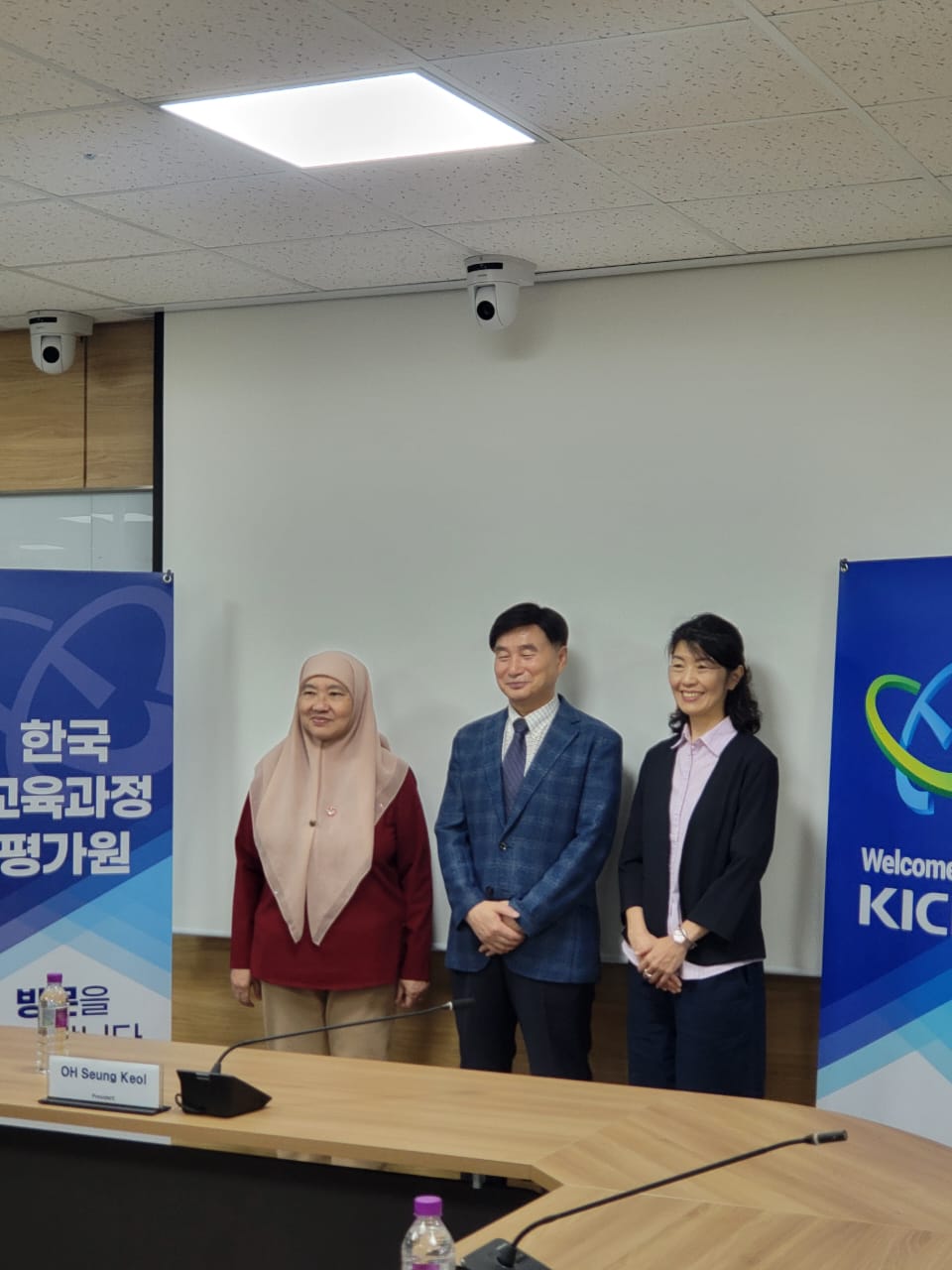
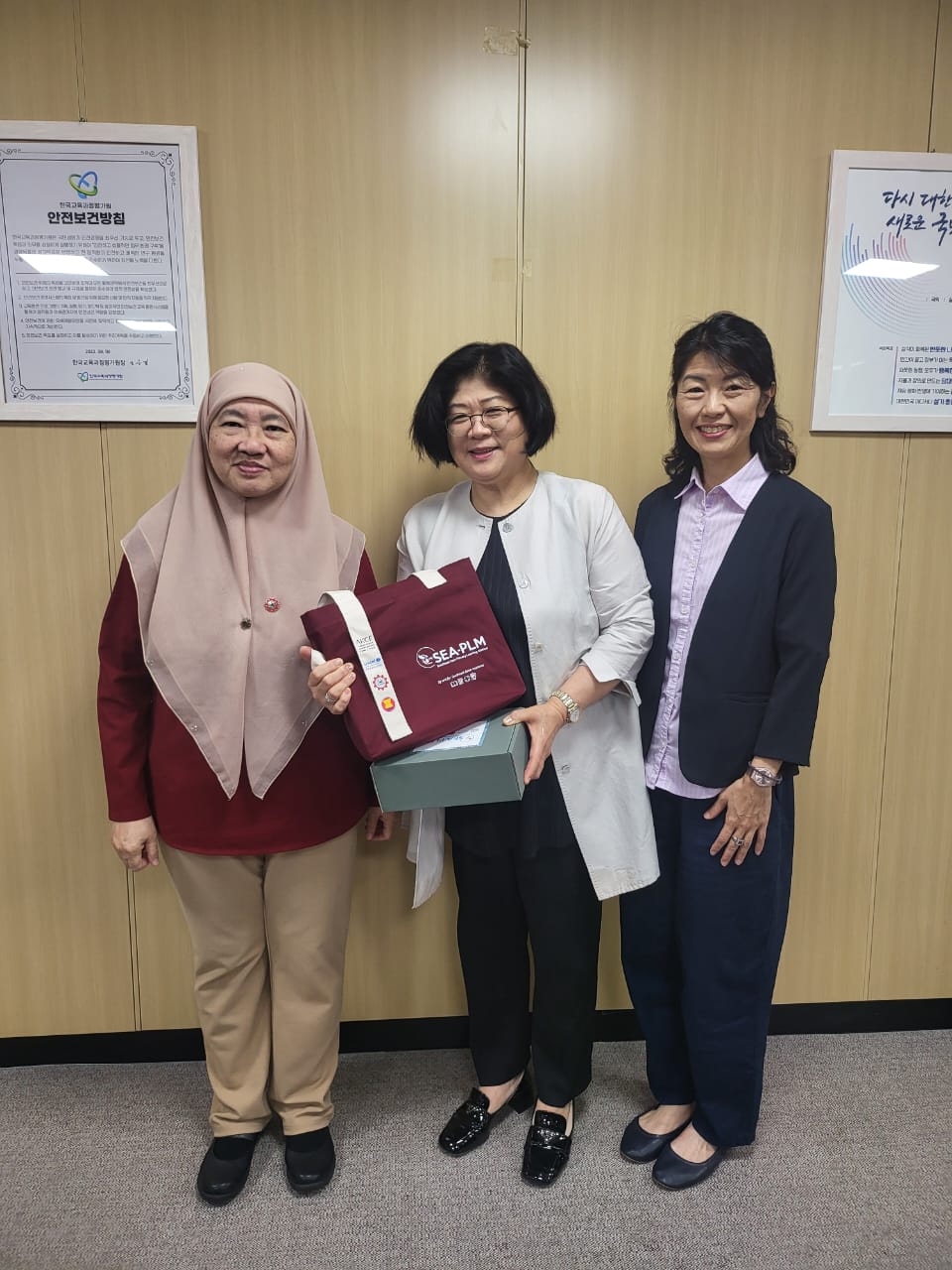
A Collective Commitment to Educational Progress
The meetings with ASEAN-EYSD, AKCF, the Korean Mission to ASEAN, and KEDI reaffirmed a collective commitment to sustaining and advancing the SEA-PLM programme. The discussions underscored the importance of continued collaboration and leveraging regional and Korean expertise to enhance countries’ capacity to use data-driven evidence in transforming basic education systems. This shared effort aims to improve educational outcomes across Southeast Asia, ensuring that all children have access to equitable, high-quality education.
As SEA-PLM prepares for its next phase, the programme’s partners are united in their mission to drive educational reforms that will contribute to the achievement of the UN SDG 2030 Education Goals in Southeast Asia. Through these strengthened partnerships, SEA-PLM is positioned to make a lasting impact on the region’s education landscape.
|
|
|
|
|
|
|
|
–
For media inquiries and more information, please contact:
Rizky Ashar (This email address is being protected from spambots. You need JavaScript enabled to view it.), SEA-PLM Regional Secretariat
SEA-PLM Quality Embodied through its 2024 Test and Questionnaire Assessment Framework
The Southeast Asia Primary Learning Metrics (SEA-PLM) programme strives to achieve the rigor and quality of international large-scale assessments (ILSA) while addressing the unique challenges and contexts of Southeast Asian countries. The 2024 Test and Questionnaire Framework exemplifies SEA-PLM’s commitment to scientific rigor and high-quality development of cognitive tests and questionnaires, serving as an external measurement of education systems in the region.
Considering the unique educational contexts of Southeast Asian countries, the framework emphasizes the relevance of the literacy-based approaches and contents, ensuring the assessment encompasses a broad range of proficiencies of what children can do and their potential for continuous learning. This makes SEA-PLM 2024 instruments responsive and suitable countries’ and local needs.. The assessment framework includes a detailed definition of literacy in reading, writing, and mathematics, and outlines the processes for incorporating emerging skills and 21st century constructs in the questionnaires administered across stakeholders.
The confirmation of the SEA-PLM survey initiative as a cyclic comparative study in Southeast Asia – SEA-PLM 2024 as the second round - offers new perspectives to refine and improve some
components of the original framework developed for the first round of SEA-PLM. The aim is to
maintain a strong and robust foundation, based on many trend items and similar test formats and data collection procedures, to allow comparisons of trends over time between Grade 5 cohorts across the future cycles of assessment.
This document presents the SEA-PLM 2024 test and questionnaire framework to take into account lessons learned, experiences and the latest methodology direction of the survey. Key contents are presented in 5 chapters, SEA-PLM surveys approach (Chapter 1), cognitive test – reading (Chapter 2), writing (Chapter 3) mathematics (Chapter 4), and contextual questionnaires (Chapter 5). The final version of the SEA-PLM 2024 contextual student, parent, teacher and school questionnaires master source version in English are accessible in Annex 1, 2, 3 and 4. The SEA-PLM 2024 assessment framework is designed to be flexible to accommodate future survey iterations.
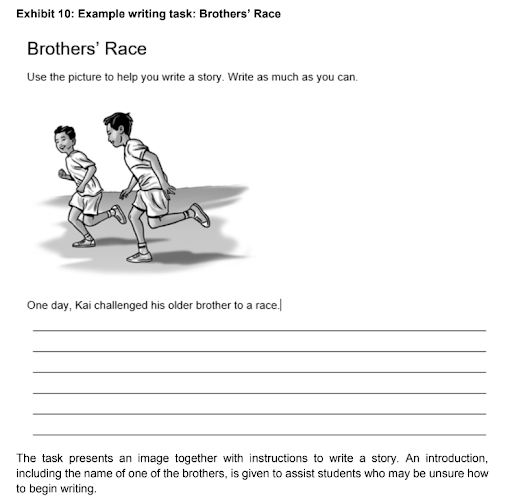
To gain a deeper understanding of how the SEA-PLM survey has been implemented using this framework and designed tests and questionnaires, SEA-PLM is pleased to publish and invite the education expert to explore the assessment framework document. This comprehensive guide offers insight into the development process, the rationale behind the updates, and the specific methodologies employed. Check the document to see how SEA-PLM continues to advance educational assessment and contribute to the improvement of primary education across Southeast Asia.
You can access the document on the SEA-PLM 2024 test and Questionnaire Framework here https://www.seaplm.org/index.php/sea-plm-2024/frameworks-2024
|
|
|
|
|
|
|
|
–
For media inquiries and more information, please contact:
Rizky Ashar (This email address is being protected from spambots. You need JavaScript enabled to view it.), SEA-PLM Regional Secretariat
SEA-PLM Regional Secretariat participates in the 2024 Educational World Forum London in advancing foundational learning, emergence of AI, and addressing Climate Change.
The 2024 Education World Forum, held from May 19 to 23 at the Queen Elizabeth II Center in London, brought together key figures from the global education sector to discuss and shape the future of education. Among the participants were the Southeast Asia Primary Learning Metric (SEA-PLM) Regional Secretariat program Co-Chair, Datuk Dr Habibah Abdul Rahim and Mr Alejandro S. Ibañez. Their participation underscored SEA-PLM's role in contributing to global discussions tackling important issues in education such as foundational learning, emergence of AI, and addressing Climate Change. The participation in the forum was made possible with the support from the UK Government through the UK International Development under the ASEAN-UK SAGE programme.
Datuk Dr Habibah participated as a member of the panel during the APAC breakfast meeting, along with Baroness Barran, Professor Sir Steve Smith, and Mr Craig Farmer (left to right).
The forum kicked off with the APAC breakfast meeting, hosted by Baroness Barran MBE, the UK Minister for the School and Student FInance. This gathering offered an opportunity for ministers and senior delegates to connect and discuss regional educational developments. Datuk Dr Habibah delivered a presentation on the SEA-PLM program, sharing insights from the SEA-PLM 2019 report and its implications for education policies and practices in Southeast Asia. Moreover, her presentation emphasized the program’s alignment with the Supporting the Advancement of Girls’ Education (SAGE) initiative, a collaboration aimed at enhancing educational opportunities for girls in the region, a program that received support from the UK government.
Datuk Dr Habibah Abdul Rahim and Mr Alejandro S. Ibañez represent the SEAMEO Secretariat and SEA-PLM Programme in the Education World Forum
In a series of side meetings, the SEA-PLM team engaged with delegations from Cambodia and Lao PDR, focusing on the unique educational challenges and priorities of these countries. The meeting with Cambodia’s delegation, led by His Excellency Mr Oung Borat, Secretary of State and Head of the Cabinet of Deputy Prime Minister, Ministry of Education, Youth and Sports, highlighted the need to improve foundational skills in early grades to prepare students for SEA-PLM assessments. The discussion also highlighted the importance of elevating girls’ education and integrating AI and digital skills to bridge educational gaps.
|
|
|
|
Side meetings of Datuk Dr Habibah and Mr Ibanez with the Cambodia (left), led by Mr His Excellency Mr Oung Borat, Secretary of State and Head of the Cabinet of Deputy Prime Minister of the MoEYS, and Lao PDR (right), headed by His Excellency Prof. Dr Phout Simmalavong, Minister of the MoES. |
|
Similarly the meeting with Lao PDR’s delegation, led by His Excellency Prof. Dr Phout Simmalavong, Minister of Education and Sports, revealed the struggles faced by primary schools, particularly those serving diverse ethnic groups. The focus on early childhood education, teacher training, and ensuring access to education for special needs students were key areas that the Ministry intends to tackle in order to advance education in the country. . These dialogues not only fostered mutual understanding but also laid the groundwork for future collaborations to enhance educational quality and equity.
|
|
|
Side meeting and main forum at the Education World Forum 2024
The Education World Forum underscored the critical importance of foundational skills as building blocks for human development, emphasizing their relevance to global challenges like climate change and the rise of AI. The forum also highlighted the “Human” side of education, advocating for a return to its philosophical roots, values, and morality. This holistic approach resonates with the SEA-PLM team, reinforcing the commitment to promoting foundational learning and humanizing education in Southeast Asia and beyond.
SEA-PLM Compendium of items: Advancing foundational skills in reading and mathematics
SEA-PLM 2024 Main Survey rolls out in Lao PDR, the Philippines, and Viet Nam
Bangkok, 31 May 2024 - Following the success of the 2023 Field Trial, the SEA-PLM programme launched its 2024 Main Survey, with Lao PDR, the Philippines, and Vietnam leading the first batch of implementation.
More than 20,000 students and parents, along with over a thousand teachers from more than 500 randomly selected schools across these countries, are contributing to the comprehensive monitoring of student learning outcomes in basic education. SEA-PLM is supported by the ASEAN-Korea Cooperation Fund.
Utilizing regionally-developed instruments on reading, writing, and mathematics including global citizenship, alongside contextual questionnaires, the 2024 Main Survey collects relevant information on students’ proficiencies and captures factors affecting learning in basic education in the region. Leveraging on strong collaboration between the SEA-PLM Regional Secretariat, partners, and the Ministries of Education, the 2024 Main Survey upholds stringent adherence to the SEA-PLM technical standards, embracing best practices gleaned from international large-scale assessments.

School personnel including SEA-PLM nominated school coordinator and test administrator, representative from the central, provincial, and district offices of the ministries of education, IQMs from ASEAN Secretariat, Korean Education Development Institute (KEDI), Korea Institute for Curriculum Evaluation (KICE) and the SEA-PLM regional secretariat in Lao PDR, Philippines, and Vietnam.
During the administration of the 2024 Main Survey in the three countries, representatives from esteemed organizations such as the SEA-PLM Regional Secretariat, ASEAN Secretariat, Korean Education Development Institute (KEDI), and Korea Institute for Curriculum and Evaluation (KICE) served as International Quality Monitors (IQM). Their presence was instrumental in maintaining rigorous standards and ensuring the high quality of data collection processes throughout the survey implementation..
The commencement of the SEA-PLM 2024 first batch of main surveys marks the initiation of a year-long data collection endeavor. As preparations unfold for the second batch, attention now turns to the remaining SEA-PLM participating countries, namely Cambodia, Malaysia, Myanmar, and Timor Leste.
|
|
|
|
|
|
|
|
–
For media inquiries and more information, please contact:
Rizky Ashar (This email address is being protected from spambots. You need JavaScript enabled to view it.), SEA-PLM Regional Secretariat

